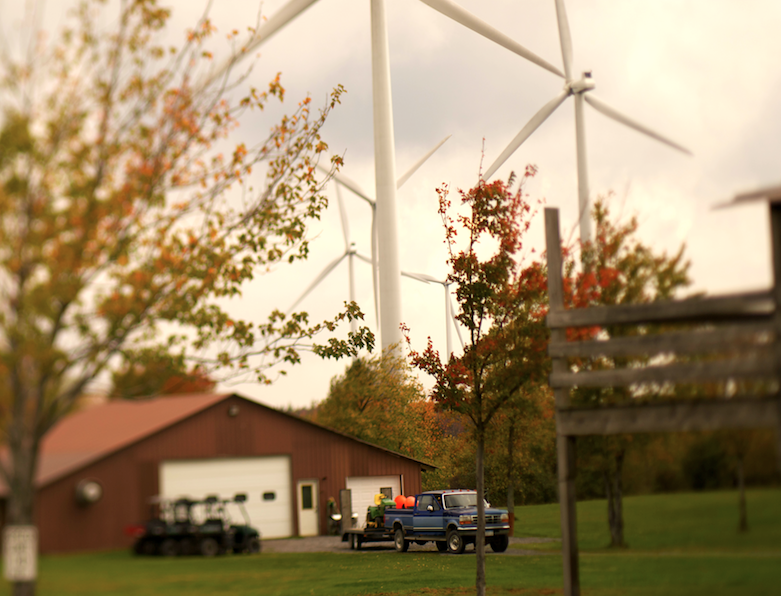Do We Need to Sacrifice Communities in the Name of Progress?
by Addison Del Mastro | February 12, 2013

A recent documentary film, “Windfall,” explores the tradeoffs associated with renewable energy through the experience of a fading farm town in upstate New York.
A decade ago, wind power executives approached the rural town of Meredith (population 1,500) with an alluring proposal: build 40 industrial turbines in the area, with the promise of bringing jobs and economic revival. What followed was a bitter division between supporters and skeptics of the project.
The turbines would bring needed revenue to the town, residents argued, but they could kill bats and birds. They would provide clean energy and help reduce climate-altering emissions, but they were noisy and ugly. The project may sound good, but the company is giving us only one side of the story. And so on.
The film ended with a town election, in which new officials were swept in who rejected the wind proposal. The skeptics celebrated with great enthusiasm. But the unfolding drama raised many important points relating to corporate power and environmental justice.
Environmentalists have an enthusiasm for all things green, and for good reason. But we sometimes forget that GE or Toyota or any other company working in green energy is just that—a company. Green energy is a product, and the same corporations that sold us oil furnaces and coal plants will sell us green energy if they can make money at it. Their product may change, but we can’t necessarily expect their philosophy of business—and concern for the bottom line—to be any different.
We decry the way that incinerator companies, for example, will come into poor, politically weak towns, divide the people, tempt them with promises, and then leave them with a dioxin-spouting smokestack in their backyard. We are right to recognize the wrongness of what happens in cases like this. But we have been far less vocal about cases where the same thing has been done by green companies. We may like wind power and dislike incinerators, but this does not change the fact that the corporate strategy is often the same.
By the same token, it was interesting to watch this saga unfold in a town skeptical of green energy. The critics of “sustainable development” are often the same people who are not concerned about environmental injustice. Yet this was, in a sense, exactly what drove the rural residents of Meredith to fight wind energy. Perhaps this will make such critics more sensitive to the plight of other energy “victims”—those who are not powerful enough to fight energy projects that are far dirtier, such as mountaintop removal for coal that explodes mountains, clogs rivers, and buries graveyards.
At the end of the day, one unfortunate reality remains: given the way our economy works, there will likely always be a community that must be sacrificed for the "greater good." If it isn’t wind turbines in Meredith (a far lesser evil, as energy sources go), it’s an incinerator in Newark, or mountaintop mining in West Virginia, or a fracking well in Pennsylvania. And whatever the merits of the particular project, the same social divisions, the same acute need for money, and the same sense of exploitation will engulf the sacrificial community.
The answer to all of this is more than a wind turbine here or a “clean coal” plant there. It is a reinvention of the way our economy functions, of the way it treats the environment and the way it treats people. It’s not that clean energy is not the answer; it’s that the answer is much more than just that.
What this new economy will look like we cannot be sure, but we see glimpses of it in so-called “benefit corporations,” solar cooperatives, and other business approaches that don’t exclusively put profits over people. Even so, it is a heavy responsibility to bear—for companies, governments, and citizens alike—to help create a system where no community is exploited in order for both human society and the environment to thrive.
Addison Del Mastro is a student at Drew University and a former intern at New Dream.

